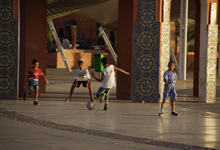 The family is the first environment with which a child interacts; it is considered as the backcloth behind his experience and knowledge. It affects him as well as shapes up his behavior, either negatively or positively. Moreover, it takes upon itself several functions, most important of which is to prepare a life opportunity for children as well as prepare them to take part in society.
The family is the first environment with which a child interacts; it is considered as the backcloth behind his experience and knowledge. It affects him as well as shapes up his behavior, either negatively or positively. Moreover, it takes upon itself several functions, most important of which is to prepare a life opportunity for children as well as prepare them to take part in society.
Sahraoui society by nature accords great attention to woman and children. In fact, the advancement in conditions that Sahraoui woman has known has made her take an important position in work life as well as in different sectors of economic activity. This is what explains the improvement that has occurred in her life being improved in some global ways, for she has become an economically productive member of society. In fact, Sahraoui woman has been able to reach the first rank among women in the Kingdom. The question here pertains to a structural specificity, not an ancillary phenomenon. The child, in turn, enjoys a markedly great attention from the moment s/he is born until they become efficient members of society. In fact, after seven days from the time when a child (whether male or female) sees the light of day, the family organizes the ‘aqiqa ceremony wherein s/he is given a name. In this regards, seven names are chosen which customarily consist of those of the cousins, grandparents; the names of saints; or of some socially known personalities. Of those seven names, one is chosen through lot-casting; the women chose seven mellow (ripe) pieces of wood to each of which one name is attached. Thereafter, the seven pieces of wood are handed over to the mother, who does not show up during the name selection process, to choose one piece. She in fact makes three rounds of choice, the third one of which carries the name that will be given to the newborn baby.
One other characteristic of the Sahraoui family is generosity and the good reception of guests. In fact, receiving a guest in Sahraoui society takes place along the lines of autochthonous Arab manners; one finds that when a housewife prepares a meal, she cooks much more than is needed for the family in case a friend, a relative; or a guest should show up at the last minute. Also Sahraoui tea, in terms of the ritual that informs its preparation, has a peculiar aspect to it, one which reflects a side of Sahraoui people’s reception of their guests; in addition to their generosity and largesse, Sahrouis manifest other characteristics such as solidarity, unanimity, the care to renew kinship relations through frequent visits as well as concern for the sick and assistance to the poor.
The Sahraoui way of greeting other people is especially distinctive, for it is characterized by warmth, praise and the exchange of greetings, which everyone takes care to manifest with lots of attention whenever they meet each other (the opposite is not treasured, and is in fact considered as a lack of courtesy). A greeting oftentimes begins with handshaking, whereupon each person lifts up their hand towards their chest only to put it on their heart as a sign of respect for others. Then they hasten to engage in a flow of successive questions and answers about the family, children, health and overall situation. The interaction happens so quickly that sometimes a question is responded to by another similar question, the reason being that the way they frame their questions and answers differs from one person to another. Each individual has their own way of greeting which they have routinely acquired, except for some specific details relative to one individual or another, in which case the reply fits in with the question (expressions such as ‘not bad,’ ‘pretty well,’ ‘in good shape’ are illustrative here). Greeting phrases; moreover, are not lacking in continual interruptions that are filled with expressions such as “such is God’s will,’ ‘praise be to God,’ and ‘by the grace of God.’ Such a way has for long attracted the attention of non-Sahraouis.